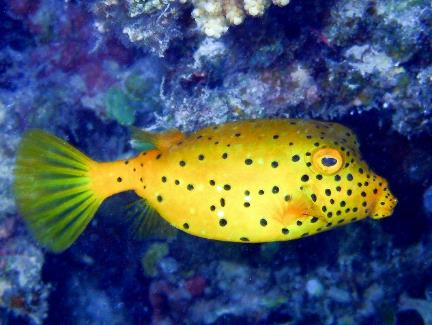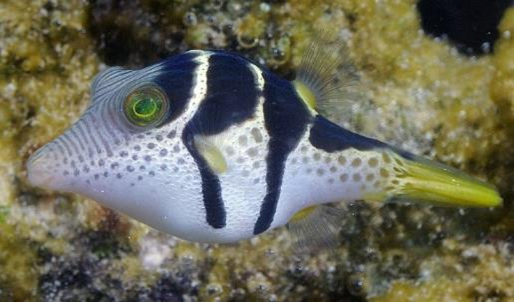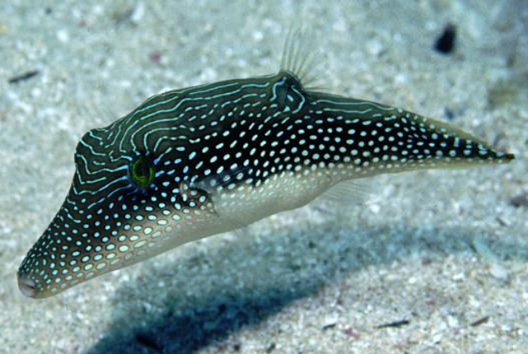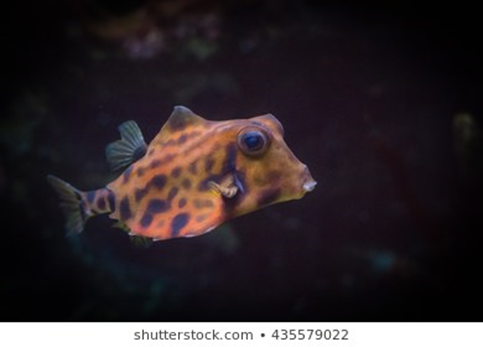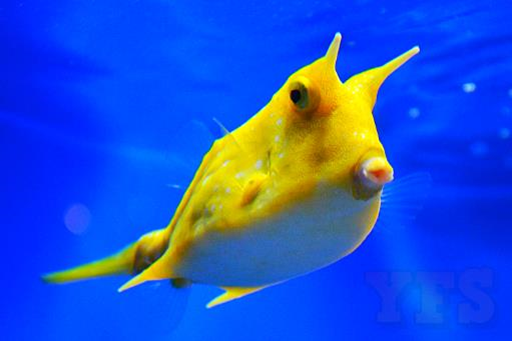Oceans of the World Zone
NAME : Yellow Boxfish
NAME OF THE SPECIE: Yellow Boxfish
LOCATION : Found in reefs through out the pacific ocean & indian ocean as well as the south eastern atlantic ocean
HABITAT: Found in the shallower & warmer Parts of the reefs
WEIGHT: UPTO 45cm UPTO 2 kg
DIET: Not Details
FOOD: Feed all kinds of live and frozen foods. Best to feed small amounts several times a day. We generally feed squid, shrimp (the same kind people eat), mussels, and all kinds of chopped up fish.
FOOD & DIET: Feed all kinds of live and frozen foods including quid, shrimp and mussels.
FACT: This is a juvenile Polka-dot Boxfish, Yellow Boxfish, or Blue-spotted Boxfish. It's so cute! It's amazing that this little fellow will grow up to be an adult thats 18 inches (45 cm)!If stressed, the Cubicus Boxfish releases a poisonous substance, called ostracitoxin, from its mucous glands which will kill other fish in the tank very quickly.
NAME : Valentins Sharpnose Puffer Fish
NAME OF THE SPECIE: Valentins Sharpnose Puffer Fish
LOCATION : Canthigaster valentini is known from the Red Sea and East Africa to Micronesia and the Tuamotu Archipelago, and Australia to the Pacific coast of southern Japan, South Korea and the coast of Taiwan.
HABITAT: Canthigaster valentini is a reef-associated species found among coral heads and rocks of sub-tidal lagoons and seaward reefs at depths of 1 to 55 m. It is also found in seagrass beds, and has been known to settle on and associate with artificial reefs.
WEIGHT: UPTO 11cm UPTO 0.03 Kg
DIET: Not Details
FOOD: They will also eat the inhabitants of reef tanks (e.g., decorative crustaceans). You should feed your sharpnose puffer a diet of chopped seafood, crustaceans, mysis shrimp, and frozen food for marine fish. Puffers often feed on algae in the tank
FOOD & DIET: They feed on a diet of chopped seafood, crustaceans, mysis shrimp, and frozen food but will also eat the inhabitants of reef tanks (e.g., decorative crustaceans).
FACT: Puffer fish are so named because of their ability to inflate their bodies as a defense against predators. Puffers inflate their bodies by filling it with air or water. This causes them to appear larger and it also makes them harder for predators to swallow.It is highly poisonous to eat
NAME : Pearl Toby Puffer Fish
NAME OF THE SPECIE: Pearl Toby Puffer Fish
LOCATION : This reef fish is found in Indo-Pacific waters, including the Red Sea.
HABITAT: Canthigaster margaritata is a reef-associated species which is common in tide pools near reefs and in shallow reef areas. It is also known to colonize artificial reefs. This species is a facultative corallivore, ingesting skeletal material and including soft coral in its diet. The filefish Paraluteres arqat mimics this species in the Red Sea
WEIGHT: UPTO 12 cm UPTO 0.03 Kg
DIET: Not Details
FOOD: Offer a varied diet for omnivores. Meaty items should include krill, vitamin-enriched brineshrimp, chopped cockle/ mussel/ hard-shelled shrimp/ squid/ fish/clam meat etc., and herbivore rations such Nori, spirulina tablets, vegetable matter etc. Browses on red and green filamentous algae, red coralline algae, and devours many tiny critters found in the live rock
FOOD & DIET: Feed on a variety of meaty items like krill, vitamin-enriched brineshrimp, squid, fish and herbivore rations like Nori, spirulina tablets, vegetable matter .
FACT: Also known as Pufferfish, Sharp-nosed Puffers, Margaritata Pufferfish, Red Sea Pufferfish and Spotted Sharpnose Puffer. Found singly or in pairs in protected lagoons, channels, reef flats and tide pools. The bodies of Pufferfish are covered in a toxic mucus, if the skin or flesh is consumed it can be fatal to humans.
NAME : Humpback Turret fish
NAME OF THE SPECIE: Humpback Turret fish
LOCATION : Indo-West Pacific: Red Sea and East Africa to Indonesia, north to southern Japan, south to northern Australia. Immigrated into the southeastern Mediterranean through the Suez Canal.
HABITAT: The Humpback Turretfish is usually found in deep offshore waters over coastal slopes and sheltered muddy and sandy substrates. It is also occasionally found near shallow algae and seagrass beds with silty rubble substrates, and areas of part-destroyed coral reefs, and rocky outcrops.
WEIGHT: UPTO 30 cm UPTO 0.1 Kg
DIET: Not Details
FOOD: It Feeds on a wide variety of invertebrate & algae
FOOD & DIET: Feed on a wide variety of invertebrate & algae
FACT: Tetrosomus gibbosus, commonly called camel cowfish because of the hump on its dorsal keel. Other common names include helmet cowfish, humpback turretfish and thornbacked boxfish.Like other boxfish, its flesh is poisonous
NAME : Longhorn Cowfish
NAME OF THE SPECIE: Longhorn Cowfish
LOCATION : Cowfish, Longhorn Cowfish, or Long-horned Cowfish are found in the Indo-Pacific: Red Sea and East Africa to the Marquesan and Tuamoto islands, north to southern Japan, south to Lord Howe Island.
HABITAT: Inhabits inshore on coastal muddy or sandy habitats in still bays, and commonly found in harbours and estuaries.Found in weedy areas near rocks or reefs. Juveniles often near river mouths and in brackish water.
WEIGHT: UPTO 50 cm UPTO 0.1 Kg
DIET: Not Details
FOOD: All kinds of meaty foods and greenstuffs. This puffer will enjoy all kinds of meaty foods including shrimp, worms, clams, various mussels, snails, tunicates, and fish.They are not picky eaters and will quickly become adapted to a variety of prepared aquarium foods and an occasional algae wafer. Flake food is not recommended.
FOOD & DIET: Feed on green and meaty foods including shrimp, worms, clams, various mussels, snails, tunicates, and fish.
FACT: Probably the most well known of the boxfish! The Cowfish, Longhorn Cowfish, or Long-horned Cowfish can be seen in almost every public aquarium. They are hardy and they love to eat!
વૈજ્ઞાનિક નામ : Ostracion cubicus
જાતિનું નામ: Yellow Boxfish
સ્થાન: વિગતો નથી
લંબાઈ અને વજન: વિગતો નથી
ખોરાક (વૈકલ્પિક) આહાર : ક્વીડ, ઝીંગા અને મુશેલ્સ સહિતના દરેક પ્રકારના સજીવ અને થીજવેલા ખોરાક ખાય છે.
વિશેષતા: આની સુંદરતાથી છેતરાઈ ન જતા. તાણ અનુભવવાથી ક્યુબીકસ બોક્સફિશ તેની શ્લેષ્મ ગ્રંથીઓમાંથી ઓસ્ટ્રાસિટોક્સિન નામનો ઝેરી પદાર્થ છોડે છે. જેનાથી ટેન્કમાં રહેલી અન્ય માછલીઓ ઝડપથી મારી જાય છે.
વૈજ્ઞાનિક નામ : Canthigaster valentini
જાતિનું નામ: Valentins Sharpnose Puffer Fish
સ્થાન: વિગતો નથી
લંબાઈ અને વજન: વિગતો નથી
ખોરાક (વૈકલ્પિક) આહાર : સમુદ્રી ખોરાક ના ટુકડાઓ, ક્રસ્ટેશિયન્સ, માઈસિસ ઝીંગા અને થીજવેલા ખોરાક ખાય છે. સાથે સાથે ખડકોના ખાડામાં રહેલા અન્ય જીવ જેવા કે ક્રસ્ટેશિયન્સ પણ ખાઈ શકે છે.
વિશેષતા: શિકારીઓથી બચવા માટે તે પોતાનું શરીર ફુલાવી શકે છે એટલે તેને પફર ફિશ કહે છે. તે પોતાના શરીરને હવા કે પાણીથી ભરીને ફુલાવે છે જેથી તે ઘણી મોટી દેખાય છે અને પરભક્ષીઓ તેને ગળવામાં મુશ્કેલી અનુભવે છે.
વૈજ્ઞાનિક નામ : Canthigaster margaritata
જાતિનું નામ: Pearl Toby Puffer Fish
સ્થાન: વિગતો નથી
લંબાઈ અને વજન: વિગતો નથી
ખોરાક (વૈકલ્પિક) આહાર : તે , ક્રિલ , વિટામિન યુક્ત ઝીંગાઓ, સ્ક્વીડ અને માછલીઓ જેવી માંસલ આહાર લે છે, ઉપરાંત તૃણભક્ષી પણ છે અને તે નોરી , સ્પાયરુલીનાની ટીકડીઓ અને વનસ્પતિજન્ય આહાર પણ લે છે.
વિશેષતા: પફર ફિશ ના શરીર ઝેરીલા શ્લેષ્મ આવરીત હોય છે. તેની ત્વચા કે માંસ મનુષ્ય માટે ઘાતક હોઈ શકે છે.
વૈજ્ઞાનિક નામ : Tetrosomus gibbosus
જાતિનું નામ: Humpback Turret fish
સ્થાન: વિગતો નથી
લંબાઈ અને વજન: વિગતો નથી
ખોરાક (વૈકલ્પિક) આહાર : વિવિધ પ્રકારના કરોડરજ્જુ વિનાના જીવો અને શેવાળને ખાય છે.
વિશેષતા: ટેટ્રોસોમસ ગિબોસસની પીઠ ખૂંધ જેવા આકારની હોવાને લીધે તેને સામાન્ય રીતે કેમલ કાઉફિશ કહેવામાં આવે છે. બોક્સફિશની અન્ય પ્રજાતિઓની જેમ આ માછલીનું માંસ પણ ઝેરીલું હોય છે.
વૈજ્ઞાનિક નામ : Lactoria cornuta
જાતિનું નામ: Longhorn Cowfish
સ્થાન: વિગતો નથી
લંબાઈ અને વજન: વિગતો નથી
ખોરાક (વૈકલ્પિક) આહાર : તે વાનસ્પતિક અને ઝીંગા, કીડા, વિવિધ પ્રકારના મુશેલ્સ, ગોકળગાય, ટ્યુનીકેટ્સ અને માછલીઓનો માંસયુક્ત આહાર લે છે.
વિશેષતા: લોંગ હોર્ન કાઉફિશ તેના માથા અને શરીરના નીચલા ભાગ પરના શિંગડા થી ઓળખવામાં આવે છે, જેથી શિકારીને તેને ગળી જવામાં મુશ્કેલી થાય છે. તેના શિંગડા ઘણીવાર તૂટે છે પરંતુ થોડા મહિનામાં પાછા ઊગી જાય છે.
वैज्ञानिक नाम : Ostracion cubicus
जाति का नाम : Yellow Boxfish
जगह: कोई विवरण नहीं
लंबाई और वजन: कोई विवरण नहीं
खाना: कोई विवरण नहीं
भोजन (वैकल्पिक) आहार: ये क्विड, झींगे और शंबुक समेत सभी तरह के सजीव एवं जमाए गए खाद्य खाती हैं।
विशेषता: इनके भोलेपन के बहकावे में मत आएं। जरा सा भी तनाव में आने पर क्यूबिकस बॉक्सफिश अपनी श्लेष्मा ग्रंथि से एक विषैले पदार्थ का स्राव करने लगती है, जिसे ऑस्ट्रासिटॉक्सिन कहते हैं और जो टैंक में मौजूद अन्य मछलियों को भी तेजी से मार देती है।
वैज्ञानिक नाम : Canthigaster valentini
जाति का नाम : Valentins Sharpnose Puffer Fish
जगह: कोई विवरण नहीं
लंबाई और वजन: कोई विवरण नहीं
खाना: कोई विवरण नहीं
भोजन (वैकल्पिक) आहार: ये कटे हुए सीफूड, क्रस्टेशियस, मायसिस झींगे और जमाए गए खाद्य खाती हैं और साथ ही रीफ टैंक के दूसरे निवासियों (जैसे कि सजावटी क्रस्टेशियस) को खाती हैं।
विशेषता: इसे पफर फिश इसलिए कहते हैं क्योंकि यह शिकारियों से बचने के लिए अपने शरीर को फुला सकती है। यह शरीर को हवा या पानी भर कर फुलाती है जिससे यह बड़ी दिखने लगती है और इस तरह शिकारियों के लिए इसे निगलना बहुत मुश्किल हो जाता है।
वैज्ञानिक नाम : Canthigaster margaritata
जाति का नाम : Pearl Toby Puffer Fish
जगह: कोई विवरण नहीं
लंबाई और वजन: कोई विवरण नहीं
खाना: कोई विवरण नहीं
भोजन (वैकल्पिक) आहार: ये क्रिल, विटमिन से भरपूर समुद्री झींगे, स्क्विड और मछलियों जैसी मांस वाली चीजों के अलावा नोरी, स्पिरुलिना टैब्लेट एवं वनस्पतियों जैसी शाकाहारी चीजें भी खाती हैं।
विशेषता: पफर फिश का शरीर एक विषैले श्लेष्मा से ढका रहा है। इसकी त्वचा या मांस खाना मनुष्यों के लिए जानलेवा हो सकता है।
वैज्ञानिक नाम : Tetrosomus gibbosus
जाति का नाम : Humpback Turret fish
जगह: कोई विवरण नहीं
लंबाई और वजन: कोई विवरण नहीं
खाना: कोई विवरण नहीं
भोजन (वैकल्पिक) आहार: कई तरह के अकशेरुकी प्राणियों एवं शैवालों को खाती है।
विशेषता: टेट्रोसोमस गिबोसस की पीठ वाले हिस्से पर एक कूबड़ जैसा होने के कारण इसे आम तौर पर कैमेल काउफिश कहा जाता है। बॉक्सफिश की अन्य प्रजातियों की तरह इसका मांस भी विषैला होता है।
वैज्ञानिक नाम : Lactoria cornuta
जाति का नाम : Longhorn Cowfish
जगह: कोई विवरण नहीं
लंबाई और वजन: कोई विवरण नहीं
खाना: कोई विवरण नहीं
भोजन (वैकल्पिक) आहार: ये हरी भरी वनस्पतियों और झींगे, कीड़े, सीपियाँ, विभिन्न प्रकार के शंबुक, घोंघे, ट्यूनिकेट्स और मछलियाँ खाती हैं।
विशेषता: लोंग होर्न काउफ़िश को माथे और शरीर के निचले हिस्से पर लगे सींग से पहचाना जाता है, जिससे शिकारियों को उसे निगलते समय मुश्किल होता है। सींग अक्सर टूट जाते हैं लेकिन कुछ महीनों में फिर से आ जाते हैं।






